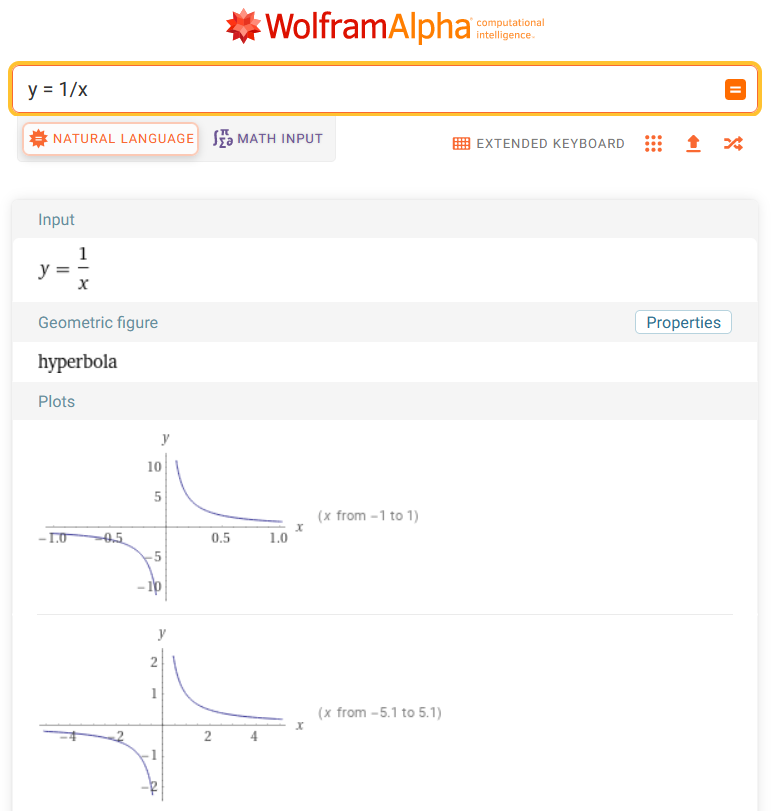Graphing the equation y=1/x produces some weird behaviour as x approaches 0; the limit is ∞ since it is impossible to divide by 0. The invisible line that seems to appear at x = 0 is called an asymptote, and therefore, anything that is asymptotic approaches “a given value as an expression containing a variable [which] tends towards infinity” (‘Definition of Asymptotic | dictionary.com’). Math jargon aside, the idea is that as the value of x becomes increasingly small, its corresponding y value will increase exponentially as the function seemingly “avoids” x = 0, where x can be either a negative and positive number.

This is what I imagine is taking place when reading about Kant’s idea of perfection in The Metaphysics of Morals. In part one of Doctrine of the Elements of Ethics, specifically Book II Section II §22, Kant explicitly states that ‘perfection’ refers to a continual striving toward an ideal, as he states that it is not possible to actually reach a final point or destination of some type (Kant 241). Therefore, we ought to orient our efforts toward the notion of betterment or personal growth, rather than actually achieving a state of perfection. As my partner puts it, “perfection necessarily includes the imperfections.”
Then by chance, if there is such a thing, some of Kant’s sentiments implicitly appeared in a book I finished recently about the work of Carl Jung by Mary Esther Harding. In the conclusion, she states “we should never forget that the world is made up of individuals, and that the one thing within our reach is our own development: it should not be neglected however much it may cost” (Harding 217). Personal growth is not easy, but it is the one aspect of our lives we have the most control over, despite how challenging it may feel in the moment. As such, we have a duty for striving toward a vague idea of perfection, all the while knowing that it is not meant to be achieved, which should come as a relief to many. One’s duty is to continuously try to do one’s best, and should that be insufficient or fail in some way, to reflect on it and accept it for its reality rather than feeling bad about it. According to Kant, this effort is what makes us more virtuous (Kant 242), and indeed, as one improves their skills in any domain, we are justified in having faith that our efforts do pay off eventually.
Although the word ‘virtuous’ is a quite rich and complex, or loaded, depending on one’s perspective, one way of thinking about it can be through the idea of a musician: Hilary Hahn is a virtuoso (virtuosa?) at the violin because she has this particular skill, but also because she “excels in musical technique or execution” (‘Definition of Virtuoso | dictionary.com’). Anyone who has trained in music or sports deeply understands that the only route toward improvement is practice, and as one continues to work, their abilities improve. Hilary will still make mistakes from time to time; she isn’t perfect but she understands that the only way to improve is to keep practicing until she can play Paganini or Sibelius as perfectly as possible on a given occasion. Never forget that the word ‘perfect’ is also a verb, as in “to perfect one’s skill”, and that because we will always be fallible and imperfect humans, are still vulnerable to making mistakes under certain conditions, like fatigue. Rather than worrying about “being perfect”, we ought to worry about striving toward betterment instead.
Maybe one poetic interpretation of the graph above is to view the x-axis as the number of mistakes made, while the y-axis represents one’s skill level: as the number of mistakes approaches zero, it can never actually be zero, and at the same time, one’s skill level only grows in value, approaching a never-ending concept like infinity, suggesting a boundlessness which is far more important, in my mind, than never making a mistake in the first place.
The moral of the story is that all the blood, sweat, and tears will pay off when one earnestly works toward one’s goals, provided acts of self-reflection about this progression are honest. If not, it will be difficult to determine just how to tailor one’s efforts in such a way which reduces certain mistakes or shortcomings. If one can accept that ‘perfection’ is not a final destination or state, but an activity, it seems as though just about anything is possible, albeit over an indefinite amount of time.

Works Cited
‘Definition of Asymptotic | Dictionary.com’. www.dictionary.com, https://www.dictionary.com/browse/asymptotic. Accessed 13 Oct. 2022.
‘Definition of Virtuoso | Dictionary.com’. www.dictionary.com, https://www.dictionary.com/browse/virtuoso. Accessed 13 Oct. 2022.
Harding, Mary Esther. The I and the Not-I: A Study In The Development of Consciousness. Princeton University Press, 1974.
Kant, Immanuel. The Metaphysics of Morals. Translated by Mary Gregor, Cambridge University Press, 1991.